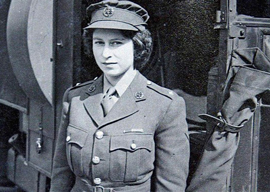
September 11, 2014

Princess Elizabeth, 1945
Traditional culture, on the other hand, was cherished and strengthened by the decades of isolation. Education was refashioned on the meritocratic Soviet model, with emphases on the sciences and classic British culture. Schoolchildren learned Shakespeare and Dickens by rote: in the more advanced classes they studied Russian novelists and poets: British names regularly appeared in Nobel Prize and Fields Medal lists.
Both the Church of England and the Catholic Church in Ireland at first attempted to cooperate with the Soviet authorities. These efforts crashed up against the antireligious ethos of the communists, especially after the Winchester Massacre of 1959, and the churches retreated to a grim, barely-tolerated existence, allowing them to emerge in the 1980s as foci of patriotic discontent. When, in 1984, the outspoken dissident Margaret Thatcher”hailed as “our new Boadicea“”took sanctuary in Canterbury Cathedral, the Scargill régime dared not move to arrest her …
The great national revivals that followed the withdrawal of Soviet troops in late 1990 were not as surprising as they seemed at the time. Occupation had fostered an intense patriotism in both British and Irish people, along with an understanding of their mutual dependence and dulling of old grievances.
Long experience of being garrisoned by foreign troops speaking a foreign language had revived the prickly isolationism that visitors had noted among the British far back in medieval times. Like the Japanese under their occupation, the British and Irish kept their manners; but they also kept a determination that their nations should henceforth remain theirs …
Following the fall of the Soviet régime, the British, fortified by returned émigrés”most notably Princess Elizabeth”quickly found their feet, emerging in the early 21st century as a major economic and cultural power. It is amusing to speculate how things might have turned out if the islands had kept their independence from 1951 to 1991. Would they, like the free Western nations, have opened their borders to waves of unassimilable Third Worlders, destroying social harmony and reducing their historic populations to foreigners in the lands their fathers had fought for? We shall never know …